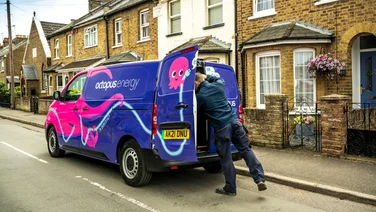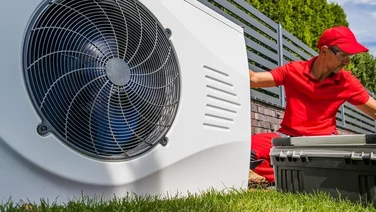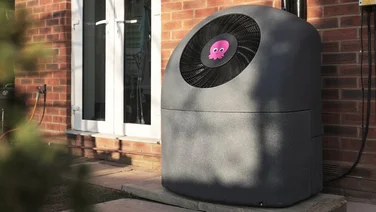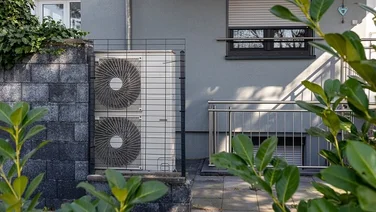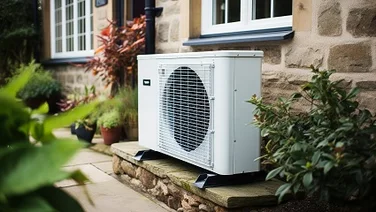✔ Mitsubishi’s existing range covers both residential and commercial properties
✔ Mitsubishi heat pumps cost between £2,500–£12,000
✔ Mitsubishi air source heat pumps last between 20 and 30 years
With the ongoing gas crisis and the government’s boiler ban looming in the near future (2035, to be exact), heat pumps are getting a lot of attention. And if you’re thinking of getting one you might be wondering about heat pump costs, how can you get the best deal, and which make and model you should go for.
In this article, we’re looking at air source heat pumps from Mitsubishi, seeing whether they’re worth it, how much they cost, and what their advantages and disadvantages are.
If you want to jump straight in, fill in this simple form. We’ll put you in touch with our suppliers, who’ll get back to you with quotes for air source heat pumps and their installation, though not necessarily for Mitsubishi heat pumps.
What type of central heating do you currently use?
Get started
The Mitsubishi air source heat pump range
Founded in 1870, Mitsubishi remains one of the world’s foremost innovators in industry, electricals, and motors. Now, it has moved into the energy sphere, working to create some of the best-regarded heat pumps available on the market.
Mitsubishi’s existing range covers both residential and commercial properties, with a variety of available models to suit almost any home. On that note, we’ve written a helpful guide on exactly what size heat pump you’ll need for your property.
The Ecodan air source heat pump range basically covers the flagship heat pumps of Mitsubishi. All MCS approved, Ecodan air source heat pumps have already won numerous awards, and Mitsubishi claims they’ve been specifically designed for UK conditions.
See below for a rundown of the best Ecodan air source heat pumps.

Ecodan R32 Ultra Quiet PUZ Monobloc Air Source Heat Pump
The R32 Ultra Quiet PUZ Monobloc air source heat pump provides efficient, low-noise heating for domestic applications. Its main advantage is how quiet it is, which helps the heat pump circumvent almost all planning permission requirements.
The pump can be operated remotely too, with the help of a simple app. This allows you to adjust the heating when out and about, so you don’t need to worry about coming home to a cold house.
This pump is flexible in terms of power options as well, with 6, 8.5, and 11.2 kW (kilowatt) options available. All but the very largest properties will be covered with just one of these heat pumps.
Ecodan R32 Ultra Quiet PUZ Monobloc ASHP (air source heat pump) specifications:
Available power options: 6.0 kW, 8.5 kW, 11.2 kW
Minimum operating temperature: -20°C
Efficiency rating: A+++
Ecodan R32 Compact PUZ Monobloc Air Source Heat Pump
Like its ultra-quiet sibling, the R32 Compact air source heat pump also promises to be muted enough to get around planning permission restrictions. It also has the added benefit of being substantially smaller, so in situations where noise doesn’t matter but size does, this model gains an advantage.
The R32 Compact has remote control too, and like the R32 Ultra Quiet, can be operated using Mitsubishi’s MELCloud software. If there is a downside to this model, it’s that the only power option available is 5 kW. Whilst this is absolutely fine for a typical three-bedroom property, any space larger than this will struggle to heat up efficiently.
Ecodan R32 Compact PUZ Monobloc ASHP specifications:
Available power options: 5 kW
Minimum operating temperature: -20°C
Efficiency rating: A+++
Ecodan R744 QUHZ-W40VA Monobloc Air Source Heat Pump
This model is ideal for small homes, apartments, and properties with a high domestic water requirement. With an output of only 4.5 kW however, a single R744 is not enough for properties larger than three bedrooms (unless you decide to stack multiple units).
Ecodan R744 QUHZ-W40VA Monobloc ASHP specifications:
Available power options: 4.5 kW
Minimum operating temperature: -15°C
Efficiency rating: A+++
Mitsubishi hybrid air source heat pump
Mitsubishi doesn’t actually manufacture a dedicated hybrid air source heat pump – instead, its Ecodan heat pumps can be easily installed alongside an existing boiler system.
The main advantage of this is that when the air outside becomes too cold for a heat pump to function efficiently, a gas-powered boiler can pick up the slack.
Now for most UK customers, it’s unlikely that the air will get cold enough for this to be necessary. But there is still a chance – which is why some people choose to integrate a heat pump with their existing boiler system.
What type of central heating do you currently use?
Get startedDucted and ductless Mitsubishi air source heat pumps
Mitsubishi manufactures both ducted and ductless air source heat pumps. Here’s how they differ:
Mitsubishi ductless heat pump
Ductless heat pumps don’t require there to be any existing ducts in a property – individual units distribute heat to whatever room they’re placed in. Because you don’t need to add additional infrastructure with ductless heat pumps, they’re quick and easy to install.
The downside is that wall units can appear bulky, especially if you’re installing a unit in each room.
Mitsubishi ducted heat pump
Ducted heat pumps, on the other hand, use a single, larger unit to distribute heat throughout the house via strategically placed grills. They can be difficult to install if your home doesn’t already have a ductwork, but if it does then it’s usually a pretty simple process.
Even so, the existing ductwork might not be efficient enough to take full advantage of the heat pump.
Mitsubishi mini split heat pump
All of Mitsubishi’s ductless air source heat pumps use mini-split systems. This means that the heat pump, which is installed outside, can distribute heat to individual rooms more easily (and efficiently). This is a major advantage over traditional heating systems, such as gas-powered boilers, which tend to heat up the entire house. Naturally, these waste a lot of energy, as there’s little point heating up a room you’re not in.
The pros and cons of a Mitsubishi heat pump
Air source heat pumps help remove your reliance on gas or oil-powered heating. So if switching to sustainable home heating is important to you, definitely consider getting an air source heat pump.
Mitsubishi heat pump systems come equipped with their own “INVERTER” compression technology. What this means is that the heat pump maintains the exact temperature you want a room (or rooms) to be.
Mitsubishi describes INVERTER as “like a heartbeat”, in the sense that as demand for heating increases, the INVERTER speeds up its cycles, circulating more heat around a property.
Other conventional heating methods operate using a fixed-speed compressor. This leads to the heating either being fully on, or not on at all, so room temperature fluctuates and your own comfort levels are reduced.
Ultimately, far more energy is wasted when a heating system has to compensate for big swings in temperature.
Mitsubishi heat pump benefits
Mitsubishi heat pumps offer some very compelling benefits, including:
- No more gas or oil bills. Heat pumps run entirely off electricity – so it’s even better if you can power your heat pump using electricity generated from your own solar panels.
- A lower carbon footprint – if you currently use a gas boiler, a heat pump can shrink your carbon footprint by up to 44%.
- In the hotter months, some air source heat pumps (including many from Mitsubishi) can double as air conditioners – rather than taking warmth from the air outside, they draw it out from the property, cooling it down as a result.
Mitsubishi heat pump problems
- Despite not needing gas or oil to operate, heat pumps can cost more to run when electricity is expensive
- Once you go below a certain temperature (typically around -15°C to -20°C), heat pumps struggle to extract enough heat from the outside air. In turn, your property’s temperature will drop if you don’t have a backup heating system (this is where hybrid air source heat pumps win out)
- Most properties will need to install larger radiators when they get an air source heat pump, because smaller radiators don’t work efficiently
- Because so many of Mitsubishi’s heat pumps use a mini-split system, you will need to install multiple units if you want maximum temperature control. This obviously increases the overall cost substantially
How much does a Mitsubishi heat pump cost?
Average air source heat pump costs are between £2,500–£12,000, with Mitsubishi heat pumps falling into the same bracket.
We contacted Mitsubishi for a price list of its available heat pumps. Here’s a table showing a few of their most popular models:
Please be aware that these are for the units only. Expect the total cost to be around £7,500–£10,000 once you factor in installation costs.
How much maintenance does a Mitsubishi heat pump require?
If installed correctly, you can expect your Mitsubishi air source heat pump to last between 20 and 30 years before it needs replacing. As for general maintenance, it’s a good idea to get a proper service every couple of years or so, but typically air source heat pumps require minimal servicing.
You could think about checking some of the basic things yourself, including:
- Cleaning the filters, coils, and fans
- Making sure that there is a proper air flow and there are no leaves, dust, or other debris which could potentially cause a blockage.
- Check fan blades, and clean them.
However, a professional will be much better qualified to properly check that your air source heat pump is operating as efficiently as it should be.
Next steps
Mitsubishi is one the UK’s most popular manufacturers of heat pumps, accounting for about a third of all heat pump sales in the country. In terms of functionality, noise levels, price range, and ease of installation, we can confidently say that Mitsubishi heat pumps are worth it.
To get free quotes from air source heat pump suppliers, why not fill in this simple form? Once you’ve done that, we’ll put you in charge with our trusted suppliers – they’ll handle the rest! Just to be clear, the quotes you receive will not necessarily be for Mitsubishi air source heat pumps specifically.

